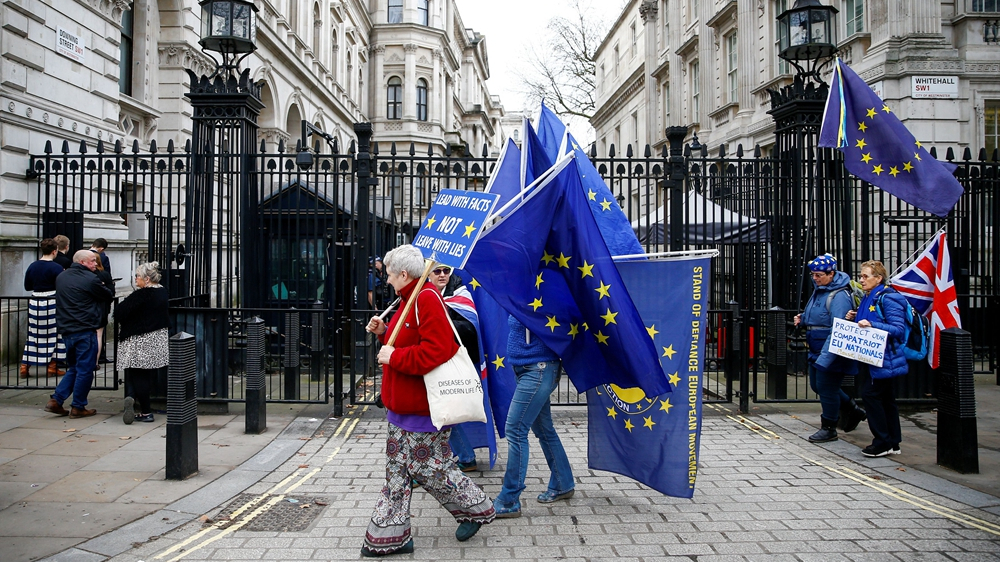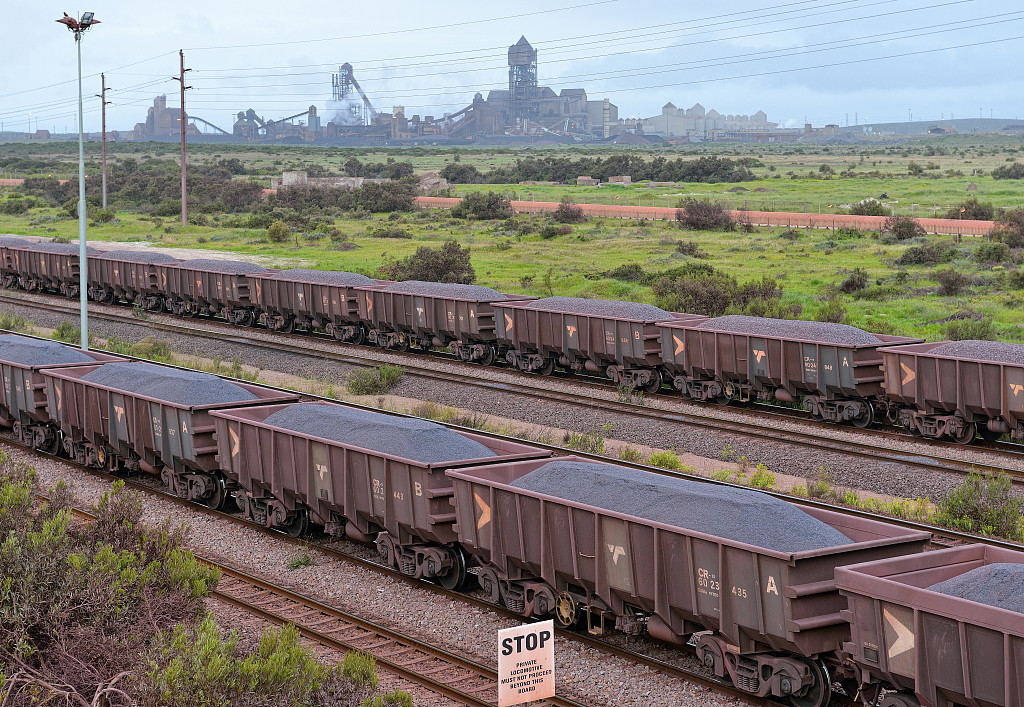
Anti-Brexit protesters in front of Downing Street in London, UK, January 8, 2020. /Reuters Photo
Anti-Brexit protesters in front of Downing Street in London, UK, January 8, 2020. /Reuters Photo
Editor's note: Richard Fairchild is an associate professor at the University of Bath School of Management. The article reflects the author's opinions, and not necessarily those of CGTN.
The UK's official Brexit date of January 31 is looming large on the horizon. In the meanwhile, the British government is considering its options for future international trade after Brexit. On January 20, the UK wooed African delegates at the UK-Africa summit in London. According to the BBC News, the British government sees opportunities for trade with Africa after Brexit.
This is a huge symbolic gesture by Boris Johnson's government. I believe he is implying that they don't need Europe, they are breaking free from the EU's shackles, and they can start negotiating their own deals with other nations. But Matthew Davies, BBC's senior journalist, questions whether they really do have such opportunities for great trade deals with the African continent. As he argues, "Trade is tricky. Trade agreements are trickier. Trade negotiations to get those trade agreements are exponentially more complicated."
When the UK leaves the EU at the end of January, it then has 11 months to come up with a trade deal with the EU. If they do not get a deal by December 31, they will revert to the complex WTO rules. It is thought that Brexit will change the whole dynamic of the bargaining games that will take place among the UK, the EU, and other nations outside the EU. Boris Johnson, and Brexiteers generally, have extolled the virtues of negotiating deals outside the EU-block. It is argued that, by leaving the EU, they can negotiate fresh deals with various trading parties, in terms that will benefit UK's citizens and economy.
However, as we have observed over the past three years since the Brexit referendum in 2016, negotiating a deal is a tricky bargaining game. There are two or more "players" in the game, and negotiations involve a tricky "dance," with offers, counter-offers, compromise, give-and-take. Each party does not get it all their own way.
It is like buying a car, and haggling over the price: The buyer wants to get it as cheap as possible, while the seller wants to push the price up as high as possible. Where the price ends up depends on the skills of the two negotiating parties, the amount of give-and-take and compromise, bargaining power/strength, and many psychological and emotional factors, such as empathy, persuasion, anxiety, toughness and desperation (to get the deal done).

Rails in Cape Town, South Africa.
Rails in Cape Town, South Africa.
There are many advantages of negotiating within a bloc (empathy, cultural closeness etc), and as a bloc negotiating with other nations. As BBC News puts it, "Being part of a big gang has its advantages and disadvantages. Yes, you have to make compromises and adapt your goals to match commonly agreed policies. But you also get the power of the bloc behind you in trade negotiations."
Although the UK will be going alone after Brexit, it remains a member of the EU Customs Union and Single Market at least until the end of December this year, and possibly beyond (there is potential for this membership to be extended by a further two years, to 2022).
Therefore, despite posturing and courtship at the UK-Africa summit in London, trade between the UK and Africa will continue according to the various existing deals already in place between the EU and Africa. After 2020, once the UK has fully-Brexited, trade arrangements between the UK and many African countries will remain the same under "continuity agreements." It means trade conditions (tariffs, quotas, etc.) will remain the same as currently in place.
One idea behind these "continuity agreements" is that the UK can then focus on negotiating deals with nations that do not currently have a deal with the EU, such as the U.S. However, uncertainty remains, as these agreements will eventually run out. The UK will then need to negotiate new deals with countries such as Africa. Furthermore, Brexit causes complexities in some of the trade processes and channels. For example, flowers are Kenya's biggest export: Currently, they are exported into the UK via Amsterdam. After Brexit, there will be potential process problems.
As argued already, a lone UK will have less bargaining power than when it was part of the big EU-club. Thus, it may be expected that the UK will achieve less favorable trade terms, as the balance of power shifts towards Africa in future negotiations. At the same time, a lone UK will be negotiating on many fronts, with many nations (U.S., EU, China, Australia). And within Africa itself, the UK will need to decide which of the African nations to prioritize in trade negotiations.
Trade negotiations are complex and require time and resources. So, the UK faces two challenges: being a lone negotiator, with much reduced bargaining power, in each deal with each nation, and then the complexities and the time-resource constraints of attempting to negotiate bilateral deals with many different nations. Perhaps, realizing these challenges, UK-African summit provides a timely opportunity for the UK to start the long complex process!
(If you want to contribute and have specific expertise, please contact us at opinions@cgtn.com.)